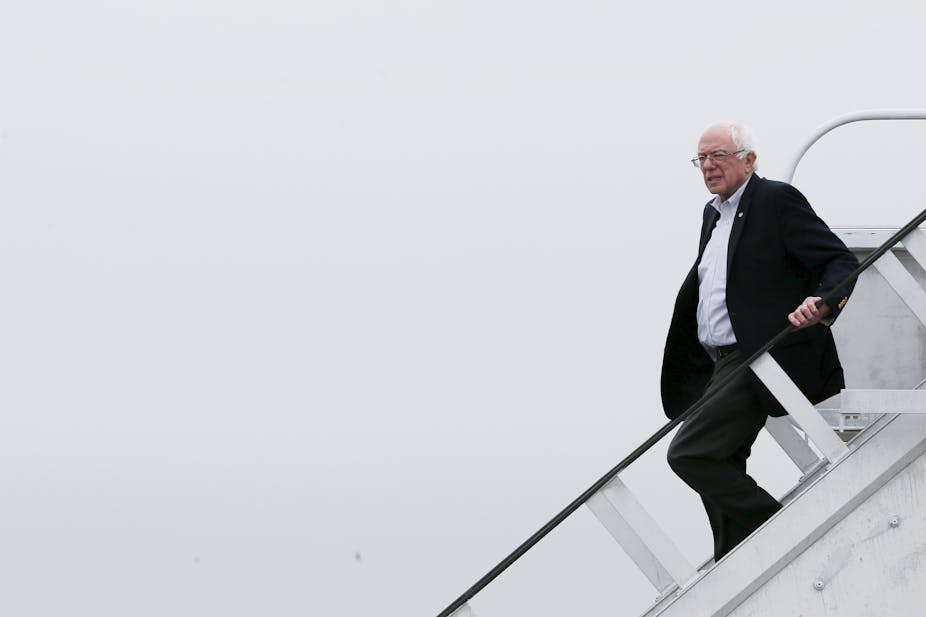Approaching the fourth contest in the Democratic presidential derby, we remain without a clear-cut favorite. This despite the “inevitability” of Hillary Clinton this time last year.
Things have changed: Bernie appears to be a threat.
Yes, Bernie lost Nevada by six percentage points.
But he’s only down by five percentage points nationally, reducing the margin by eight points in the week or so, suggesting that the gap between him and Hillary is narrowing.
Further, he did well in Iowa, losing by less than one percent, and he handily won the New Hampshire primary by 20 points. This has led some of Bernie’s backers to conclude he still has a chance.
Beyond that, he’s also giving Hillary a run for her money on the fundraising front, and using these resources to challenge her in South Carolina.
It’s true that Hillary seems to dominate on total delegate count: 503-70. But that’s only when superdelegates are included. Superdelegates – delegates that have chosen sides independent of the nomination process and who are free to change their minds – are limited to only 15 percent of the total delegate count. Leaving them aside, Bernie trails by only a single pledged delegate: 52-51.
So, can Bernie still win the nomination?
In my view, he really can’t, because black people won’t vote for him.
Different demographics in the South

Consider the recent contest in Nevada. He captured 42 percent of the minority vote, but only 22 percent of the black vote. Reports that he carried the Latino vote are open to serious question.
On “Super Tuesday,” March 1, seven of the scheduled contests will take place in southern states: Alabama, Arkansas, Georgia, Mississippi, South Carolina, Texas and Virginia. Blacks, on average, constitute roughly 25 percent of registered voters in these states. This is a problem for Sanders.
Recall that Bernie lost Nevada by six percent in a state in which blacks were only 13 percent of the electorate. I predict that, in these southern states in which the black electorate is twice the size it is in Nevada, Bernie will get blown out.
Here are three reasons March 1 won’t be super for Sanders.
-
After centuries of white folks making promises, Bernie’s “pie-in-the-sky” appeals to end police brutality, mass incarceration and sentencing disparities by race are long on generalities, but short on specifics.
Given our history, blacks are too pragmatic, even cynical, to play Charlie Brown to Bernie’s Lucy. In his “Letter from Birmingham Jail,” Martin Luther King Jr. indicates the ways in which history has taught black folk to be wary of promises made by white folks.
In the present case, with a focus on economic issues, Bernie claims that racism and income inequality are “parallel problems,” suggesting that correcting the former will remedy the latter.
This reduces race and racism to class. Class-based remedies, as Ta-Nehisi Coates and others have argued, will fail to make black people whole. They’re right. Has anyone heard of the New Deal?
The New Deal was essentially pitched as a means of making whole those most affected by the Great Depression: the lower classes. Of course, this included far more black than white folk. But, like almost everything else, the New Deal became racialized: many of its provisions deliberately excluded blacks.
-
A history of economic and social oppression, reinforced by black information networks, like churches, social clubs and music, paves the way for making race a salient identity among blacks. As a result, race-targeted policies, like those aimed at the amelioration of racism, gain traction with the two-thirds of blacks for whom race is salient.
Since Bernie’s policy proposals are almost exclusively tailored to fit the class struggle, and not the freedom struggle, his solutions will fail to curry favor with most blacks.
-
There is reason to believe that Bernie appeals to young black voters. Even so, among political scientists, it is almost an article of faith that the youth are less vigorous in their commitment to politics than their elders, even when the stakes are high.
To be sure, Hillary has her problems. Her support of the Crime Bill in 1994 – in addition to her references to some black youth as “super predators,” will continue to damage her standing among young black voters. But this appears to be a generational divide between older and younger black folk. The former are likely to forgive her support of the bill – if not the utterance – as a product of the time in which we lived.
Further, her presence in the black community predates the current election cycle, unlike Bernie’s. This, in addition to the forceful way in which she addresses sources of racism, deploring white privilege and continuing bigotry, should give her the advantage among black voters.
The Democrat primary season has a long way to go, perhaps even through June. If, however, I am correct – as I was with Trump – Bernie will feel the heat long before then. I’m thinking March 1, in good ol’ Dixie.

